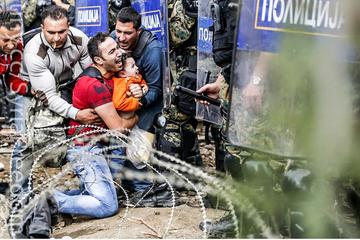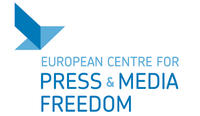
Journalists and activists have been detained by Macedonian forces during the march through which migrants and asylum seekers tried to enter Macedonia from Greece on March 14
Originally published by ecpmf.eu
Around 30 to 50 journalists have been forced to stay in police stations for many hours on 14 March, after they were arrested because of illegally crossing the border between Greece and Macedonia. Many journalists reported that security forces were explicitly watching out for journalists.
“Allegedly they tried to create a situation which could not be documented anymore”, German photo-journalist Björn Kietzman told Radioeins in an interview on 15 March, the morning after his detention.
Macedonian police forces explicitly looked for cameras and then took us away from the scene.
Kietzman himself spent more than seven hours at a police station. He and many journalism colleagues were released, but had to pay fines of up to 260 euros. Like the refugees detained at the border, they were sent back to Greece.
What led to the detention of Kietzmann, other journalists and activists was the so-called “March of Hope”: More than one thousand refugees left their camp in Idomeni, Greece, to search for an alternative route to continue their journey towards other European countries. Activists and journalists accompanied the refugees on their dangerous route – until many of them were detained by local security forces on the FYROM/Macedonian side of the border.
The incident gives the impression that Macedonian authorities tried to stop the reporting about the current refugee situation in the FYROM/Macedonian-Greece border region. Currently many journalists are there to share information and pictures about the situation with the world. Thanks to this, the “March of Hope” was followed by many people on social media channels.
Questa pubblicazione è stata prodotta nell'ambito del progetto European Centre for Press and Media Freedom, cofinanziato dalla Commissione europea. La responsabilità sui contenuti di questa pubblicazione è di Osservatorio Balcani e Caucaso e non riflette in alcun modo l'opinione dell'Unione Europea. Vai alla pagina del progetto

 Macedonia: Journalists detained during March of Hope
Macedonia: Journalists detained during March of Hope





 Tutti i contenuti disponibili sul sito di Osservatorio Balcani e Caucaso sono distribuiti con licenza
Tutti i contenuti disponibili sul sito di Osservatorio Balcani e Caucaso sono distribuiti con licenza 